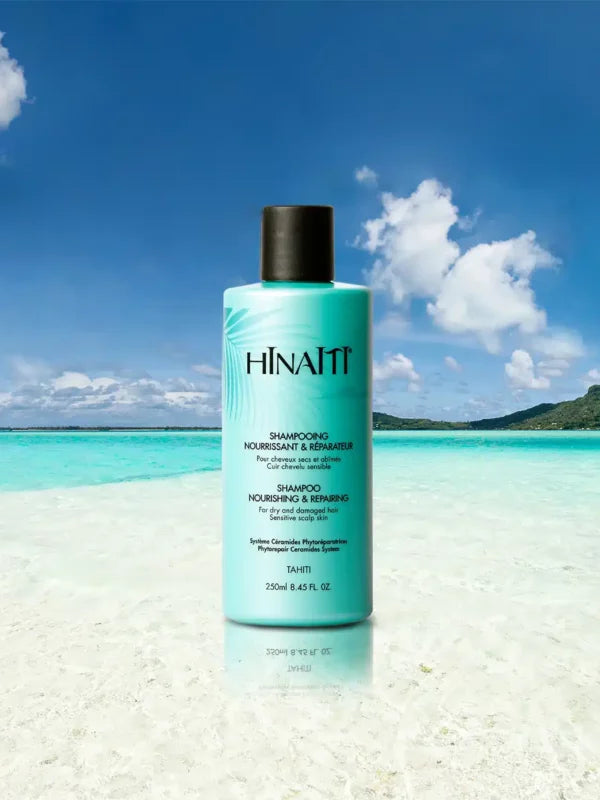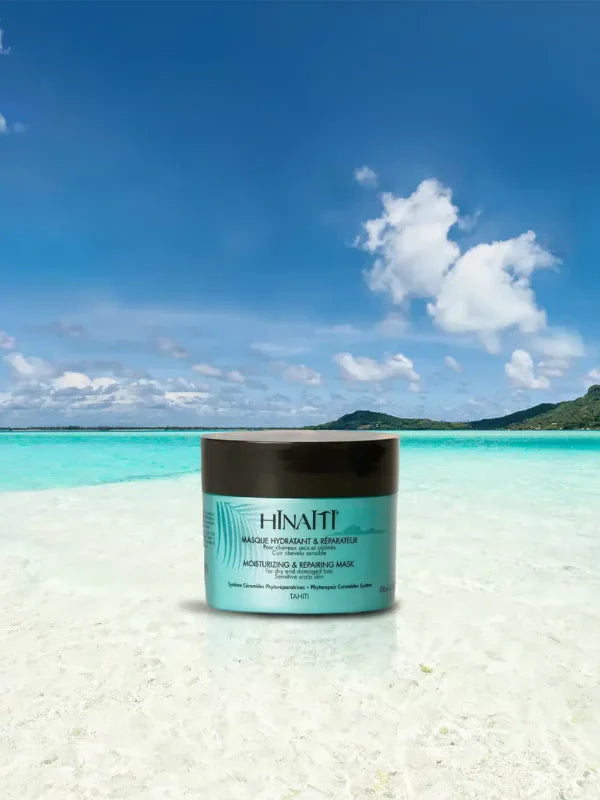LITTLE HINA
The name Hinaiti has ethnic roots in the Polynesian islands. In Polynesia, names are often linked to elements of nature, spiritual qualities, or community values: Hinaiti is a rare name that reflects a strong connection with nature and spirituality, essential aspects of Polynesian culture. In Tahitian, "Hinaiti" literally means "little Hina," Hina being a goddess of the moon and fertility in Polynesian mythology.
This connection to divinity adds spiritual and cultural depth to the name, making it even more fascinating. Hinaiti carries within her a universe of meanings and stories. Legends surrounding the goddess Hina evoke beauty, mystery, and wisdom. Discover below the legend that inspired our hair care brand.

THE STORY
Long ago, in the district of Tererauta, there lived a young girl of incredible beauty. Her name was Hina. Her brown eyes, sun-colored skin, and long, black silk hair were the pride of her parents, for she was the prettiest girl on the island.
At sixteen, her father, the district chief, decided to marry her off. He began looking for a husband worthy of his daughter.
When her wedding day arrived, Hina still knew nothing about her future husband, except that he came from the distant Teretai district. However, when her father came to fetch her to introduce her to her husband, she nearly fainted with terror when she discovered an immense eel, with a gigantic body and an enormous head: it was the prince of eels. Hina, panicking, fled to the mountains and finally arrived in the Aketura district.
She discovered an empty faré (house) hidden under a large aito (tree) and took refuge there. However, this dwelling belonged to the god Hiro, and on returning from fishing, he was dazzled by the brilliant light surrounding his house. It was Hina's hair, caressed by a ray of sunlight, that shone like this.
The young girl told the god about her terrible adventure and he agreed to hide her for a while.
However, the eel, also attracted by the brightness of the girl's hair, soon arrived in the vicinity of the god's hut. With a movement of its powerful tail, it opened a wide breach in the reef, now known as the Tapuerama Pass.
Hiro, alerted, took a long hair of Hina's, attached a mother-of-pearl hook to it and fished out the monstrous beast.
When he had pulled it up onto the shore, he cut it into three pieces.
The head fell at the girl's feet and said to her:
– All the men who hate me, and you first, Hina, one day, to thank me, you will kiss me on the mouth. I am dying, but my prediction is eternal.

The god Hiro, without wasting any time, wrapped the head with banana leaves and handed the package to Hina:
– Hina, beautiful girl, you can return to your people, and there you will destroy this head. But all along your way, do not put it on the ground, for then the curse of the eel will be fulfilled.
And Hina, accompanied by maids offered by the god Hiro, returned to Tererauta. But the road was long and the sun burned the path. They arrived at the edge of the river.
The water was cool and clear, and the girls decided to bathe in it.
Hina, forgetting the god's advice, put her package on the ground in order to join her companions.
Immediately, with a dull thud, the earth opened and swallowed the head of the dead eel... And emerging from the crack that was already closing, a tree appeared and began to grow, grow enormously.
It was a strange tree, all trunk, with a tuft of leaves at the top. It looked like an immense eel, its head pointing towards the sun.
The first coconut tree had just been born...
Hina, who had disobeyed, was condemned by the gods to live by the river, and the tree was made taboo. It was absolutely forbidden for anyone to approach it or eat its fruit.
As the days passed, a great drought soon came, destroying all food and fresh water.
Only the coconut tree resisted the sun and, despite the gods' prohibition, men gathered its fruits, which contained soft, clear, slightly sweet water.
They saw that each fruit, the size of a large melon, was marked with three dark spots arranged like eyes and a mouth... and to drink this water, they had to press their lips against this wooden design.
And Hina did like the others, without realizing that the prophecy had just been fulfilled...







